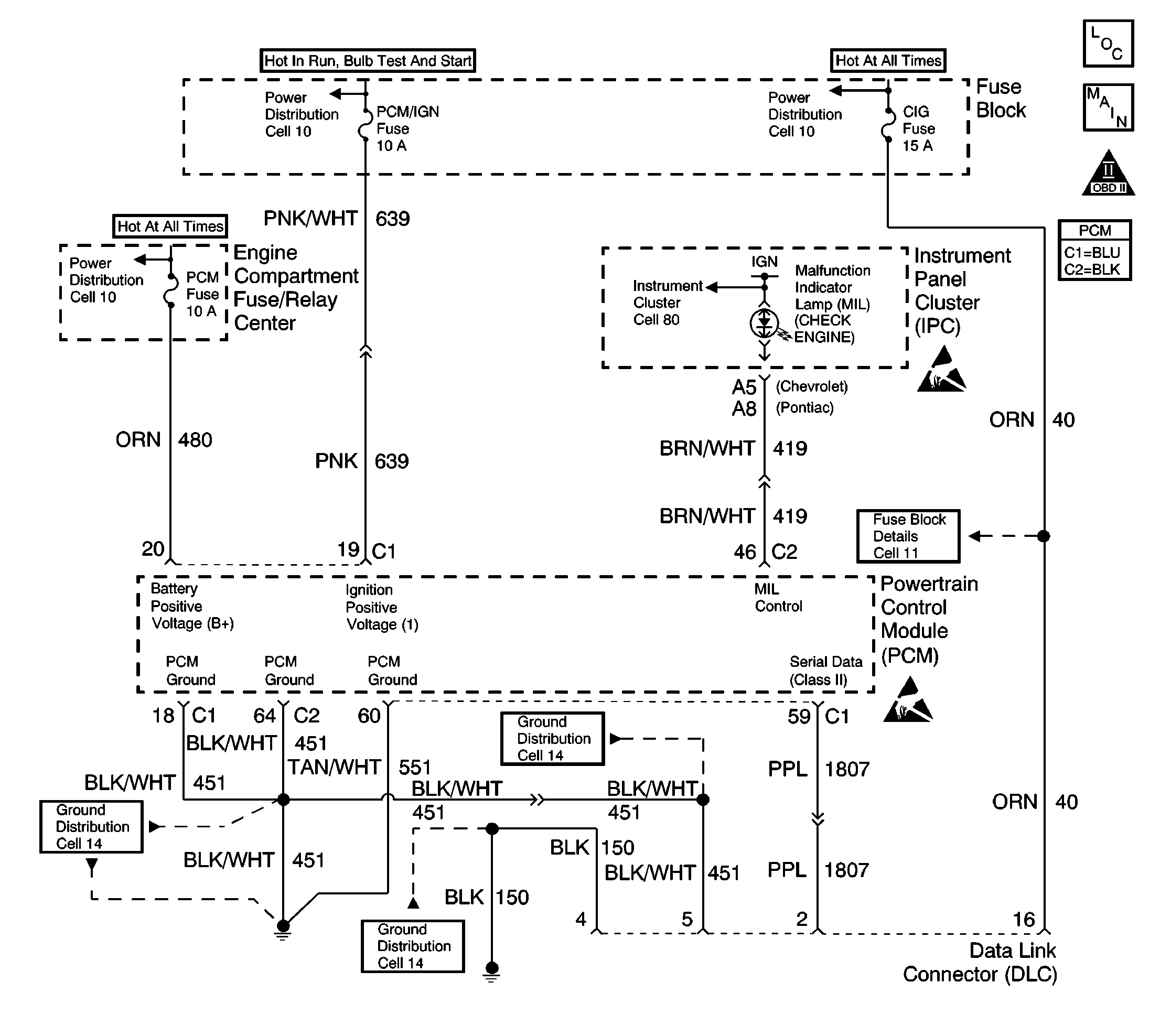
Circuit Description
When the ignition is turned ON, the malfunction indicator lamp (MIL) will momentarily flash ON then OFF and remain ON until the engine is running, if no diagnostic trouble codes (DTCs) are stored. The powertrain control module (PCM) controls the MIL by providing a ground path through the MIL control circuit to turn ON the MIL.
Diagnostic Aids
An open ignition fuse will cause the entire cluster to be inoperative, and may set DTCs P1629 and U1016.
Inspect the battery and the ignition positive voltage circuits for faulty connections if the MIL is intermittent.
Any circuitry that is suspected of causing an intermittent complaint should be thoroughly inspected for:
| • | Backed-out terminals |
| • | Improper mating |
| • | Broken locks |
| • | Improperly formed or damaged terminals |
| • | Faulty terminal-to-wiring connections |
| • | Physical damage to the wiring harness |
Test Description
The numbers below refer to the step numbers on the diagnostic table.
-
The Powertrain (OBD) System Check prompts you to complete some of the basic checks and to store the Freeze Frame and Failure Records data on the scan tool, if applicable. This creates an electronic copy of the data that was captured when the malfunction occurred. The scan tool stores this data for later reference.
-
Connections that are suspected of malfunctioning should be thoroughly inspected as described in the diagnostic aids.
-
If the engine fails to start and the MIL is inoperative, then the malfunction can be isolated to one of the following items:
-
Probing the MIL circuit with a test lamp to a ground simulates the PCM's control of the MIL. If the MIL illuminates, then the malfunction can be isolated to the control of the MIL or to a faulty electrical connection at the MIL terminal to the PCM. Electrical connections that are suspected of malfunctioning should be thoroughly inspected as described in the diagnostic aids.
-
It takes very little resistance for the battery and the ignition 1 feed circuits to cause an intermittent condition. The battery and the ignition 1 feed circuits should also be inspected for electrical connections as described in diagnostic aids.
-
A shorted MIL circuit can be diagnosed with a scan tool.
-
An open MIL circuit can be diagnosed with a scan tool.
-
For instrument panel control (IPC) replacement procedures, refer to Instrument Panel, Gauges, and Console in Body and Accessories.
-
Reprogram the replacement PCM and perform the crankshaft position system variation learn procedure. Refer to the latest Techline™ information for PCM programming.
-
If no malfunctions are present at this point and no DTCs were set, refer to the diagnostic aids for additional checks and information.
| • | An open PCM ignition positive voltage circuit |
| • | An open battery positive voltage circuit |
| • | A faulty ground at the engine block |
| • | A malfunctioning PCM |
Step | Action | Value(s) | Yes | No | ||||
|---|---|---|---|---|---|---|---|---|
Did you perform the Powertrain On-Board Diagnostic (OBD) System Check? | -- | |||||||
2 | Turn ON the ignition, with the engine OFF. Is the MIL ON? | -- | ||||||
Was a repair necessary? | -- | Go to Diagnostic Aids | ||||||
Attempt to start the engine. Does the engine start? | -- | |||||||
Does the MIL illuminate? | -- | |||||||
6 | Inspect the following fuses:
Are the fuses OK? | -- | ||||||
Was a repair necessary? | -- | |||||||
8 | Did the test lamp illuminate? | -- | ||||||
9 |
Does the test lamp illuminate? | -- | ||||||
10 |
Is the action complete? | -- | -- | |||||
Repair the short to voltage in the MIL control circuit. Refer to Circuit Testing and Wiring Repairs in Wiring Systems. Is the action complete? | -- | -- | ||||||
Was a repair necessary? | -- | |||||||
13 |
Does the test lamp illuminate? | -- | ||||||
14 | Repair the open in the ignition positive voltage feed circuit. Refer to Wiring Repairs in Wiring Systems. Is the action complete? | -- | -- | |||||
15 |
Was a repair necessary? | -- | ||||||
16 | Repair the open in the PCM battery positive voltage circuit. Refer to Wiring Repairs in Wiring Systems. Is the action complete? | -- | -- | |||||
Replace the instrument panel console (IPC). Refer to Instrument Cluster Replacement in Instrument Panel, Gauges, and Console. Is the action complete? | -- | -- | ||||||
|
Important: Refer to Powertrain Control Module Replacement/Programming . Replace the PCM. Refer to Powertrain Control Module Replacement . Did you complete the replacement? | -- | -- | ||||||
Does the scan tool display any DTCs that you have not diagnosed? | -- | Go to the applicable DTC table | System OK |
